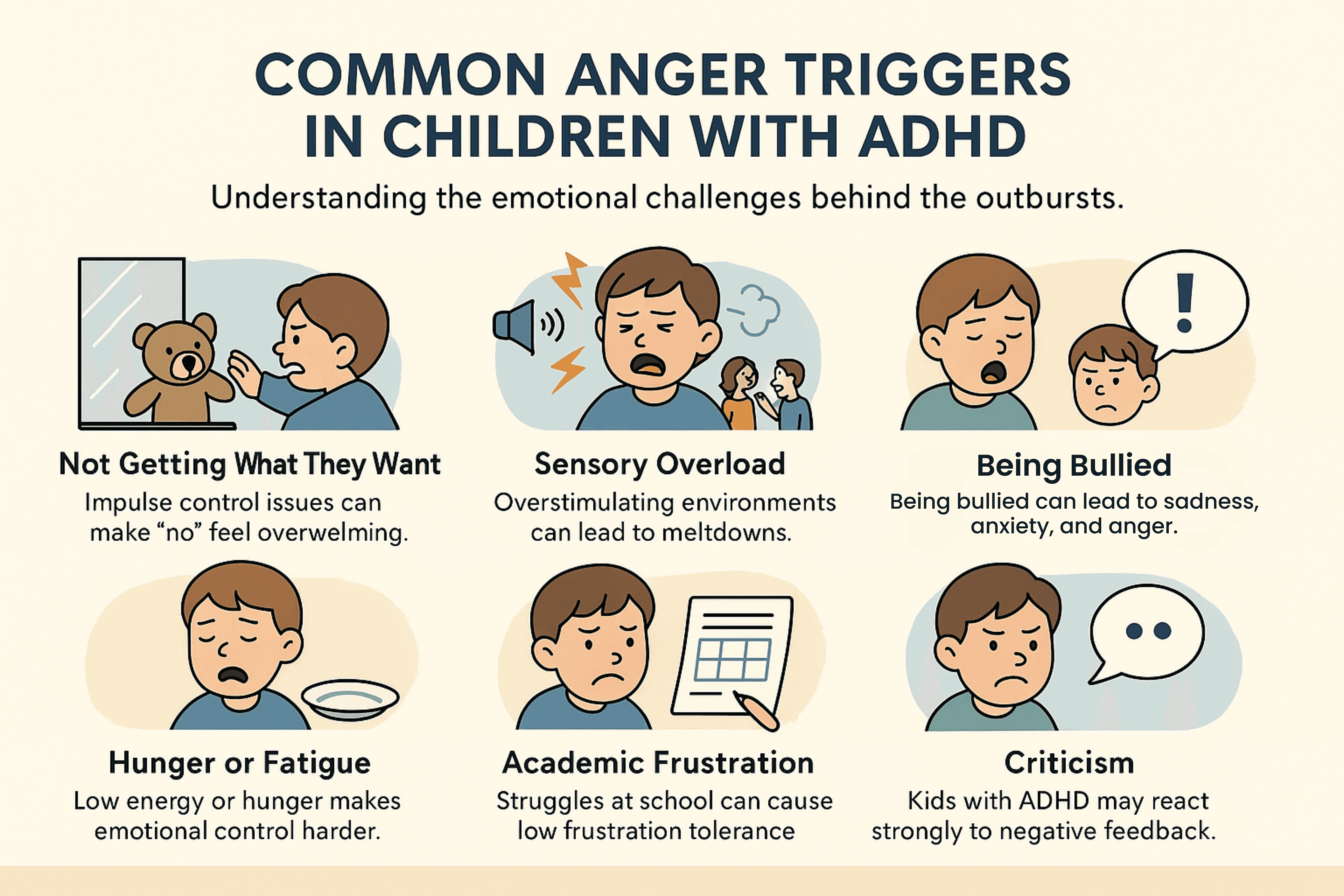Anger and ADHD: How to Support Your Child
Learn how to support children with ADHD through anger outbursts. Discover expert tips on emotional regulation, coping strategies, and when to seek professional help.


Hitting other kids. Refusing to comply. Meltdowns in the middle of the grocery store. Kids with attention-deficit/hyperactivity disorder sometimes have these types of angry behavior. Learn about the connection between ADHD and anger and what you can do to tame your child’s anger.
Key Takeaways
- Angry outbursts are common among kids with ADHD. That’s because one of the core symptoms of ADHD is emotional dysregulation. This makes it hard for kids with ADHD to control their emotions.
- Kids with ADHD are more impulsive. This can cause them to act out aggressively without thinking about the consequences of their actions.
- Therapy can help kids with ADHD gain better control over anger. Family therapy can also be helpful.
ADHD and anger
Children with ADHD experience anger more often than kids without ADHD. They are also more quick to anger. That is because kids with ADHD have emotional dysregulation, which is an impaired ability to control emotions like anger and fear.
Another reason why kids with ADHD have anger outbursts is because of impulse control problems. They may react impulsively to feelings of anger without considering the consequences of their actions.
A co-occurring condition can cause make it more likely that kids with ADHD have issues with anger control. Up to 60 percent of kids with ADHD also have oppositional defiant disorder (ODD). One of the core symptoms of ODD is a persistent pattern of angry behaviors.
Common triggers for anger outbursts
Children with ADHD can react intensely to even minor frustrations because of impaired emotional regulation skills. Here are some things that can trigger anger in kids with ADHD:
- When they can't get what they want - Many kids throw tantrums when they can’t get what they want. Kids with ADHD may be more quick to act out though due to impulse control problems.
- Sensory overload - Sensory overload is a common problem for kids with ADHD. It’s one that can lead them to feeling frustrated and angry.
- Being bullied - Kids with ADHD are more likely to be bullied. This can lead to both sadness, anxiety, and anger.
- Being hungry or tired - Almost anyone will get irritable or angry when hungry. This is colloquially known as being "hangry." If your child with ADHD gets to the point of being overly hungry, they may have a tantrum.
- Frustration - Kids with ADHD have low frustration tolerance. This often occurs in school where kids with ADHD may have trouble with academic tasks. A failure to grasp the material may lead to frustration and anger.
- Being criticized - Kids with ADHD have a heightened criticism of being criticized. They are especially sensitive to criticism and may be more likely to have an extreme emotional reaction.

How to help your child with ADHD handle anger
When your child has an anger meltdown— whether in public or at home — it can be startling to witness the amount of anger that your child is exhibiting. You may not know what to do. Here are some things that can help.
Stay calm and regulate your own emotions
One of the most important things you can do is stay calm. That’s because your child will look to you on how to handle their emotions. You’ll also be able to redirect your child better if you are calm. It can be hard to stay calm in the moment, especially if your child is having a meltdown in public. Try to anticipate their behavior. If it seems like a tantrum is inevitable, regulate yourself.
Validate their feelings without encouraging outbursts
Validate your child’s feelings and the reason for their anger. You can say something like, “I understand that you are angry because you want a new squishmallow, and you can’t have one today.” Provide them with empathy and reassurance, and once they are calm, ask if they want to talk about it. This encourages them to express their emotions positively.
Use clear and predictable boundaries
Creating boundaries with your child is crucial. Let them know that feeling angry is OK, but aggression is not. Be firm in your boundaries. When your child is angry and throwing a fit because they want their phone during “no phone time,” don’t give in. When you say no, it should be firm. Don’t change your mind and later say yes.
Teach coping strategies offer physical outlets
Help your child prepare for anger ahead of time. Teach them coping skills that they can use to manage big emotions. Encourage them to participate in calming activities like slow-flow yoga, mindfulness, and taking a timeout. These activities can calm the mind and body.
Model deep breathing for your child. Practice what this looks like. Show them how to use it when angry. When they are later in situations that make them angry, they will be better able to calm down.
Long-term strategies for managing ADHD-related anger
In addition to the techniques mentioned above, there are some longer-term strategies that can help your child better cope with anger and frustration.
Cognitive behavioral therapy
Cognitive behavioral therapy (CBT) is a type of therapy that can help kids with ADHD learn to manage anger. CBT focuses on how thoughts and emotions influence behavior. This therapy helps your child learn to identify negative thoughts that may be triggering anger. They will then be taught how to change negative thoughts. This can help improve their reactions to stressful situations that trigger anger. The therapist will also teach your child coping skills to help them calm down when angry.
ADHD-friendly discipline strategies
ADHD friendly discipline techniques focus on connection, trust, and kindness. This type of discipline involves listening, rewarding good behavior, and reminding your child that you love them. Discipline is used as a teaching tool. These positive actions make your child feel loved and respected, which, in turn, should reduce anger meltdowns in the future.
When to seek professional help
Anger is a normal emotion that all kids experience. But, if your child is frequently angry, then it’s a good idea to seek help from a mental health professional. If they have outbursts that last for a long time (more than 15 minutes at a time) or are intense, then it’s also a sign to get help.
How therapy can help
There are various types of therapy that can help kids with ADHD manage anger. Cognitive behavioral therapy (CBT), mindfulness, and family therapy are all methods that can help with anger management.
Conclusion
Anger outbursts are a common problem among kids with ADHD. There are many at-home strategies that can help. However, if your child’s anger is severe or occurs often, then it might be a good idea to seek help. Your child might benefit from seeing a therapist individually or attending family therapy.
Help your child thrive with ADHD
If your child is having frequent outbursts that don’t seem to be improving, you may be wondering if there is something else you could do to help them. If you are noticing that your child is more angry than normal, don’t wait to get them help.
Emora Health offers specialized therapy for kids with ADHD. Our therapists deliver the support you need. We offer convenient virtual care in Florida and Texas and we are in network with major insurance plans including Cigna, United Health, Aetna, and more. Begin your search for a therapist today.
- Shaw, P., Stringaris, A., Nigg, J., & Leibenluft, E. (2014). Emotion Dysregulation in Attention Deficit Hyperactivity Disorder. American Journal of Psychiatry, 171(3), 276–293. https://doi.org/10.1176/appi.ajp.2013.13070966
- American Psychiatric Association. (2013). Diagnostic and statistical manual of mental disorders (5th ed.). https://doi.org/10.1176/appi.books.9780890425596
- Kim, H., Jung, E., Lee, T., Kim, S., & Kim, H. W. (2023). Impact of Comorbid Oppositional Defiant Disorder on the Clinical and Neuropsychological Characteristics of Korean Children With Attention-Deficit/Hyperactivity Disorder. Psychiatry investigation, 20(10), 962–971. https://doi.org/10.30773/pi.2023.0091
- Lane, S. J., & Reynolds, S. (2019). Sensory Over-Responsivity as an Added Dimension in ADHD. Frontiers in integrative neuroscience, 13, 40. https://doi.org/10.3389/fnint.2019.00040.
- Ahmed, G. K., Metwaly, N. A., Elbeh, K., Galal, M. S., & Shaaban, I. (2022). Prevalence of school bullying and its relationship with attention deficit-hyperactivity disorder and conduct disorder: a cross-sectional study. The Egyptian journal of neurology, psychiatry and neurosurgery, 58(1), 60. https://doi.org/10.1186/s41983-022-00494-6
- Swami, V., Hochstöger, S., Kargl, E., & Stieger, S. (2022). Hangry in the field: An experience sampling study on the impact of hunger on anger, irritability, and affect. PloS one, 17(7), e0269629. https://doi.org/10.1371/journal.pone.0269629
- Seymour, K. E., Macatee, R., & Chronis-Tuscano, A. (2019). Frustration Tolerance in Youth With ADHD. Journal of attention disorders, 23(11), 1229–1239. https://doi.org/10.1177/1087054716653216
- Khunti, K., Boniface, S., Norris, E., De Oliveira, C. M., & Nicola Shelton (2023). The effects of yoga on mental health in school-aged children: A Systematic Review and Narrative Synthesis of Randomised Control Trials. Clinical child psychology and psychiatry, 28(3), 1217–1238. https://doi.org/10.1177/13591045221136016
- Vacher, C., Romo, L., Dereure, M., Soler, M., Picot, M. C., & Purper-Ouakil, D. (2022). Efficacy of cognitive behavioral therapy on aggressive behavior in children with attention deficit hyperactivity disorder and emotion dysregulation: study protocol of a randomized controlled trial. Trials, 23(1), 124. https://doi.org/10.1186/s13063-022-05996-5
